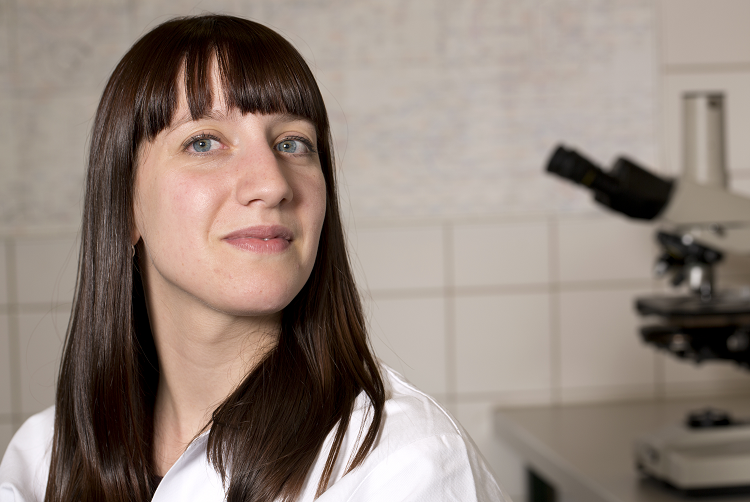An interview with Marta Cortesão - Astrobiologist (International Day of Women and Girls in Science)

In light of International Women and Girls in Science Day, we interviewed Marta Cortesão, a young female portuguese Astrobiologist. She is currently a PhD Student at the Space Microbiology research group at the German Aerospace Center (DLR) in Cologne. Marta deals mainly with the study of fungi and microbes and how they survive in extreme conditions studying their adaptation to spaceflight and outerspace conditions.
Throughout your childhood and teenage years, did you have any career aspirations?
When I was a kid I wanted to be a policewoman, and for many years I kept thinking one day I would be a musician. In my first year of high school I wanted to be a forensic doctor (CSI style) but I ended up quitting that aspiration soon after I found out that a forensic doctor was first and foremost a medical doctor. I guess what I wanted from the CSI life was to be the scientist in the lab doing experiments that help answer questions!
What discovery or invention inspires you?
Whenever we find living organisms in places we thought were sterile (like the desert, or the bottom of the ocean). It’s amazing how life can be so different from what we expect, and survive in such extreme conditions.
Why did this particular field of science draw your interest?
Astrobiology just puts everything in perspective. It approaches life in the least anthropocentric way possible, and I love that. Besides, it assumes life on Earth might not be that unique and tries to figure out what other forms of life might exist elsewhere in the Universe!
What short-term and long-term career goals do you have, if you have them?
Short-term: Would love for my next job to be something combining research and science outreach and communication!
Long-term: Would love to lead my own space experiments!
Do you think it is important to set goals?
Yes. Setting goals for myself, even if small abstract ones, helps me prioritize and focus on living my life as I want it to be. But more than setting goals, it is important to review and update these goals from time to time, and be flexible. My goals today can be very different from my goals next year (or even next month).
How do you motivate yourself whenever you're struggling, or have a difficult task ahead of you?
I listen to music and watch sci-fi movies and series – they fill me with wonder and with the sense that nothing is out of reach!
What are the main struggles of being a woman in a male dominated field?
The Space field is indeed male dominated, but the Biology research and academic community has been very much female dominated. Astrobiology and Space Microbiology fields are a weird mix between the two, also because many times industry and engineering are also in the mix. The main struggle has been to have my ideas heard. Many times people ask you for comments, for feedback, but are only pretending to listen, pretending to value your input. At conferences/meetings people may not take your research seriously because you are a young woman. It has happened to me, and happens often with other woman, even with senior scientists. Especially in the “question round” there’s often male (and sometimes female) scientists that love to put young women on the spotlight. Although feedback and discussion are key for scientific development, many times the main purpose of these questions is only to bring someone down, in public. Of course this can happen to male scientists too, but the clear preferred target is young women.
Have you ever been treated unfairly or differently from your male counterparts? Have you ever encountered any other gender biases in your journey towards becoming a scientist?
On the journey towards becoming a scientist, it is very easy to end up in a team that does not support you and that favors male scientists over female ones. I have witnessed group leaders pushing male scientists to present at conferences and be first-authors in publications even though the main work was done by a female colleague. One needs to be careful, to try and recognize such teams, ask around, and to avoid working there for long periods of time. So far I have had supervisors that openly support me, male or female. Many male “leads” I have encountered acknowledge it is time to actively change things. Mostly because they have daughters that might grow up to be in STEM, or because they had a female supervisor themselves when they were students. But acknowledging it does not mean they know exactly how to address the issues in their daily routines, but you can see them trying. And they are not the only ones that should try. Women should get used to supporting each other. It can be crazy competitive in science, even within your own team. Let go of that and help your colleagues and your students, support them (regardless of gender), help them grow!
What do you do for fun, how do you spend your free time?
Listening to music, going to concerts, exploring the city, and a lot of dinner parties! Living away from home has made having friends over for Portuguese food and board games, my favorite activity!
You are also an artist, how do you find the time to create your art and where can we find it?
I see my art a bit as productive procrastination. I do it to relax, to boost my creative self. Being creative is extremely important as a scientist. Whenever I feel I am becoming too focused on my To Do list, too much “in my head”, I stop and spend some time painting, or on Adobe Illustrator.
You can find it on social media (facebook and instagram) looking for @spacemicrobes and also on Society6 (https://society6.com/spacemicrobes)
You can find it on social media (facebook and instagram) looking for @spacemicrobes and also on Society6 (https://society6.com/spacemicrobes)
What words of advice would you give to aspiring scientists (Astrobiologists) who are just finishing high school/finishing university?
Science is international and collaborative – don’t limit yourself to one country, to one lab. Make sure you love what you are doing, and don’t stay in a lab/thesis if you realize your supervisor is not there for you. Practice your English communication and presentation skills, you will probably be talking and presenting your work more than you will actually work on it!
What is something about space that continues to puzzle you?
The fact that it is so vast, so extreme, so challenging. Space is not easy. All of our knowledge, all of our technological development, even our bodies and our senses, all of it has always been Earth-centered. So when we try to bring those beyond Earth everything needs re-adjusting. That is why we haven’t been to Mars yet, or why we still don’t have a Moon-based colony.


Comments
Post a Comment